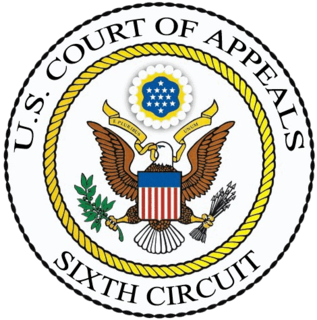Related Research Articles
Perjury is the intentional act of swearing a false oath or falsifying an affirmation to tell the truth, whether spoken or in writing, concerning matters material to an official proceeding.
A search warrant is a court order that a magistrate or judge issues to authorize law enforcement officers to conduct a search of a person, location, or vehicle for evidence of a crime and to confiscate any evidence they find. In most countries, a search warrant cannot be issued in aid of civil process.
The Uniform Code of Military Justice is the foundation of military law in the United States. It was established by the United States Congress in accordance with the authority given by the United States Constitution in Article I, Section 8, which provides that "The Congress shall have Power....To make Rules for the Government and Regulation of the land and naval forces".
The Child Protection and Obscenity Enforcement Act of 1988, title VII, subtitle N of the Anti-Drug Abuse Act of 1988, Pub.L. 100–690, 102 Stat. 4181, enacted November 18, 1988, H.R. 5210, is part of a United States Act of Congress which places stringent record-keeping requirements on the producers of actual, sexually explicit materials. The guidelines for enforcing these laws, part of the United States Code of Federal Regulations, require producers of sexually explicit material to obtain proof of age for every model they shoot, and retain those records. Federal inspectors may at any time launch inspections of these records and prosecute any infraction.

The Lanham (Trademark) Act (Pub.L. 79–489, 60 Stat. 427, enacted July 5, 1946, codified at 15 U.S.C. § 1051 et seq. is the primary federal trademark statute of law in the United States. The Act prohibits a number of activities, including trademark infringement, trademark dilution, and false advertising.
A paysite or pay site, in the adult entertainment industry, is a website that charges money to become a member and view its content, and often produces original adult content. They can be contrasted with "free-sites", which do not charge a membership fee. Most paysites offer "free tours" which allow non-members to view a limited number of short trailers. The vast majority of paysite memberships are bought by men. Some of the earliest paysites began by scanning images from pornographic magazines. The number of sites then grew until the market was saturated, and now many thousands of sites cater to every legal pornographic niche.

The PROTECT Act of 2003 is a United States law with the stated intent of preventing child abuse as well as investigating and prosecuting violent crimes against children. "PROTECT" is a contrived acronym which stands for "Prosecutorial Remedies and Other Tools to end the Exploitation of Children Today".
Telephone recording laws differ according to the country or region. Some of the countries and regions with differences in telephone recording laws include: Australia, Canada, Denmark, Finland, Germany, India, Italy, Ireland, Latvia, New Zealand, Poland, Romania, Sweden, Turkey, the United Kingdom, and the United States of America. Each region has differing laws including specifications in regards to recordings and the privacy of individuals on the call.

This article summarizes the same-sex marriage laws of states in the United States. Via the case Obergefell v. Hodges on June 26, 2015, the Supreme Court of the United States legalized same-sex marriage in a decision that applies nationwide, with the exception of American Samoa and sovereign tribal nations.

Proposition 218 is an adopted initiative constitutional amendment which revolutionized local and regional government finance and taxation in California. Called the "Right to Vote on Taxes Act," it was sponsored by the Howard Jarvis Taxpayers Association as a constitutional follow-up to the landmark property tax reduction initiative constitutional amendment, Proposition 13, approved in 1978. Proposition 218 was approved by California voters during the November 5, 1996, statewide general election.
Title 35 of the United States Code is a title of United States Code regarding patent law. The sections of Title 35 govern all aspects of patent law in the United States. There are currently 37 chapters, which include 376 sections, in Title 35.

The intellectual property rights on photographs are protected in different jurisdictions by the laws governing copyright and moral rights. In some cases photography may be restricted by civil or criminal law. Publishing certain photographs can be restricted by privacy or other laws. Photography can be generally restricted in the interests of public morality and the protection of children.

The age of consent in the United States is the age at which a person may legally consent to engage in sexual activity. Each state and territory sets the age of consent either by statute or the common law applies, and there are several federal statutes related to protecting minors from sexual predators. Depending on the jurisdiction, the legal age of consent is between 16 and 18. In some places, civil and criminal laws within the same state conflict with each other.
In People vs Freeman of 1988, the California Supreme Court stated that adult film production was to be protected as free speech under the First Amendment. They ruled that since such films did not include obscene images and indecency, and stayed within society's standards, the adult film industry should be granted the freedom of speech. Escaping highly regulated government intervention, regulation in the adult film industry has been limited to preventing child pornography. In the United States Code of Regulations, under title Title 18, Section 2257, no performers under the age of 18 are allowed to be employed by adult industry production companies. The failure to abide by this regulation results in civil and criminal prosecutions. To enforce the age entry restriction, all adult industry production companies are required to have a Custodian of Records that documents and holds records of the ages of all performers.
Child pornography laws in the United States specify that child pornography is illegal under federal law and in all states and is punishable by up to 20 years' imprisonment or a fine of $5000. The Supreme Court of the United States has found child pornography to be outside the protections of the First Amendment to the United States Constitution. Federal sentencing guidelines on child pornography differentiate between production, distribution, and purchasing/receiving, and also include variations in severity based on the age of the child involved in the materials, with significant increases in penalties when the offense involves a prepubescent child or a child under the age of 12. U.S. law distinguishes between pornographic images of an actual minor, realistic images that are not of an actual minor, and non-realistic images such as drawings. The latter two categories are legally protected unless found to be obscene, whereas the first does not require a finding of obscenity.

Commission Regulation (EC) No. 2257/94 of 16 September 1994 laying down quality standards for bananas, sometimes referred to in the media as the bendy banana law, is a European Union regulation specifying classification standards for bananas, which took effect on 1 January 1995. It was replaced by Commission Implementing Regulation (EU) No 1333/2011 of 19 December 2011 laying down marketing standards for bananas, rules on the verification of compliance with those marketing standards and requirements for notifications in the banana sector with effect as of 9 January 2012.
The Supreme Court decision in Obergefell v. Hodges that legalized same-sex marriage in the states and most territories did not legalize same-sex marriage on Indian reservations. In the United States, Congress has legal authority over tribal reservations. Thus, unless Congress passes a law regarding same-sex marriage that is applicable to tribal governments, federally recognized American Indian tribes have the legal right to form their own marriage laws. As such, the individual laws of the various United States federally recognized Native American tribes may set limits on same-sex marriage under their jurisdictions. At least twelve reservations specifically prohibit same-sex marriage and do not recognize same-sex marriages performed in other jurisdictions; these reservations, alongside American Samoa, remain the only parts of the United States to enforce explicit bans on same-sex couples marrying.
In the United States, the law for murder varies by jurisdiction. In most US jurisdictions there is a hierarchy of acts, known collectively as homicide, of which first-degree murder and felony murder are the most serious, followed by second-degree murder and, in a few states, third-degree murder, followed by voluntary manslaughter and involuntary manslaughter which are not as serious, followed by reckless homicide and negligent homicide which are the least serious, and ending finally in justifiable homicide, which is not a crime. However, because there are at least 52 relevant jurisdictions, each with its own criminal code, this is a considerable simplification.

Connection Distributing Co. v. Holder, 557 F.3d 321 is a case in which the United States Court of Appeals for the Sixth Circuit held that the record-keeping provisions of the Child Protection and Obscenity Enforcement Act did not violate the First Amendment.
The Child Protection Restoration and Penalties Enhancement Act of 1990 , Title III of the Crime Control Act of 1990, Pub.L. 101–647, 104 Stat. 4789, enacted November 29, 1990, S. 3266, is part of a United States Act of Congress which amended 18 U.S.C. § 2257 in respect to record-keeping requirements as set by the Child Protection and Obscenity Enforcement Act of 1988, also establishing prohibitions. The Act also amended 18 U.S.C. § 2243 and 18 U.S.C. § 2252 establishing and increasing penalties for sexual abuse of a minor. Also see Child Protective Services, for global practices and the approach of US.
References
- ↑ "US CODE: Title 18,2257. Record keeping requirements". Cornell Law School . Retrieved 2007-04-14.